My washing machine died its final death last week after spending the past 18 months half-heartedly swishing clothes around without cleaning them.
As we are in the process of getting off-grid, we decided it was time to start looking around for a more self-sustainable approach to getting our clothes clean.
The versatility and simplicity of twin tub washing machines appealed to us. We also looked at hand-powered portable washing machines and weighed the pros and cons of some old-fashioned approaches to laundry, like DIY bucket washing and using a washboard.
We all want a quick and easy way to clean our clothes without relying on grid power while minimizing water usage, don’t we?
Let’s explore our options.
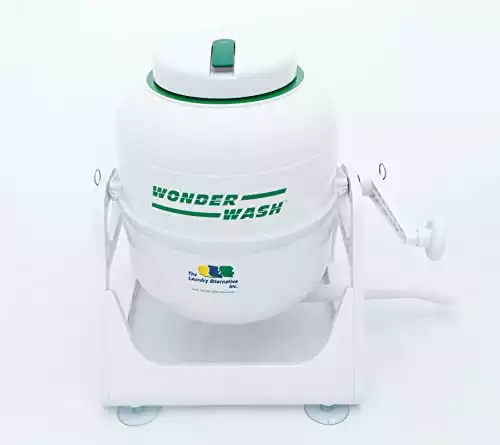 Wonderwash Non-electric
Wonderwash Non-electric
The so-called “Tardis of manual washing machines, the hand-powered Wonderwash is eco-friendly and cleans clothes effectively without giving the operator a full-body workout.
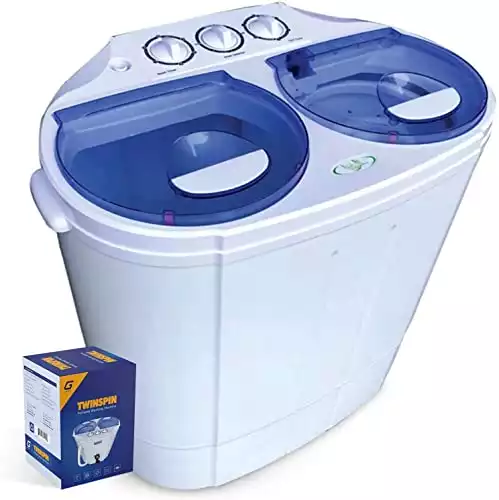 Garatic Portable Compact Mini Twin Tub
Garatic Portable Compact Mini Twin Tub
Compact, affordable, and capable of washing and spinning simultaneously.
This twin tub will save you time, money, and energy.
Our Pick of the Best: The Top Three Low-Power Washing Machines
#1 Garatic Portable Compact Twin Tub
This compact washing machine combines a water-efficient design with a powerful motor that cleans quickly and effectively while saving energy.
As you manually fill the Garatic twin tub with water, you can control how much you want to use. I also love the satisfaction of watching the filthy water drain away.
With control timers on both the washer and the spin cycle, once you’ve filled it with water and added your detergent and clothes, you can leave it to do the hard work, returning only once the cycle is complete.
Quiet and compact, the Garatic won’t keep your neighbors up at night if a sudden bout of insomnia sees you washing socks at 4 am!
While this twin tub can handle up to 8lbs of laundry, which is about the same as a standard domestic washing machine, it can only spin up to 5 lbs, making drying your clothes more time-consuming than washing them.
Cheaper than the other models in our low-power washing machines category, the Garatic is simple, effective, and affordable. If you want to go completely off-grid, it’s also easy to adapt to running off solar or wind-generated energy.
Pros
- Powerful
- Compact but with sizeable capacity
- Cleans and dries effectively
Cons
- The drain pipe is on the short side (it can be extended if necessary.)
- Limited spin capacity
#2 Think Gizmos Twin Tub Washer
This lightweight, compact twin tub is smaller and lighter than the one from Garatic and slightly more limited in its capacity, washing 7.9 lbs of laundry at a time and up to 4.4 lb in its spin cycle.
Another perk of buying a twin tub is that it requires no installation – just somewhere you can access power, water, and drain facilities. You can even use it in your bathtub and fill it using the showerhead.
Simple to use and capable of washing a full laundry basket of clothes in a single cycle, this twin tub removes stains and gets your clothes drier than a domestic washing machine.
Remember, any twin tub requires manual work – filling the washtub, setting the cycle in motion, moving the clothes to the spin tub, and so on.
For some, this makes it only marginally more effective than a manual washboard, with one user saying, “I would have gotten just as wet & only a little more of a workout by using a washboard.”
Pros
- Gets clothes cleaner than standard domestic machines
- Can save on water
- Low power consumption
Cons
- Doesn’t dry clothes effectively
- Can be noisy
#3 BLACK+DECKER Small Portable Washer
This is a single-tub option; it acts as a standard washing machine, seamlessly moving from the wash cycle into the spin cycle according to the wash program selected.
Perfect for small apartments, it is both quiet and effective, although its spin cycle can get a little noisy if over-filled.
Although it doesn’t consume as much power as a standard domestic machine, it does use a lot of water, making it unsuitable for my drought-ridden small-holding.
I prefer the twin tub’s versatility, where I can choose how much water I use, how often I rinse, and how long I wash or spin. But this is a decent option if you want a small machine that does everything without manual intervention.
Pros
- Fully automatic
- Energy efficient
Cons
- Not as versatile as a twin tub
- Heavy water usage
Our Top Picks for the Best Manual Off-Grid Washing Machine
#1 Laundry Alternative Wonderwash
We used a manual washing machine like this one while camping for years. It was a great alternative to hand washing, enabling us to clean more clothes more effectively but with less effort.
This Wonderwash manual machine seems a bit more robust than our one, but it still has a habit of jumping around a bit during use. You must also put the machine at the correct height to turn the handle without injuring yourself.
You can wash a small load of laundry in around two minutes, but there’s no way to spin your clothes, so they will be sopping wet when they come out. You could get a portable clothes dryer, but you’ll need electricity to run it.
Another downside of the Wonderwash is that it uses much more water than you would if it was done by hand. This high water consumption isn’t ideal if you’re in a survival situation or remote location with limited access to water.
The absence of any motor or moving internal parts makes for a robust machine liable to outlive the low-power options explored above. This thing will still work years after a twin tub has given up the ghost.
Pros
- Cleans clothes in under 2 minutes
- No electricity required
- Compact and portable
Cons
- Requires some effort from the operator
- Moves around when in use
- It doesn’t remove excess water
#2 Lavario Portable Clothes Washer
Editors Note: This product is out of stock and not expected to be back in production until mid 2024.
Like the Wonderwash machine, the Lavario is hand-powered and portable, making it ideal for survival situations and extreme camping adventures.
Unlike the Wonderwash machine, the Lavario uses an up and down movement rather than a crank handle, so it won’t travel around so much during the wash.
Although a wash takes around 20 minutes, this off-grid machine requires minimal arm strength. Gravity assists on the downward stroke, while buoyancy makes the upward stroke easy.
The 5-gallon basket of the Lavario can wash the equivalent of a small load in an electric washing machine. A typical load would be a shirt, T-shirt, underwear, socks, and a pair of jeans, which is a little smaller than the average Wonderwash load.
The Lavario forces a continuous flow of water through the fabric of your clothes, blasting out the dirt and leaving your clothes cleaner than many other hand-operated washing machines.
A drain cap at the bottom of the bucket makes rinsing your clothes more accessible.
Your clothes will still be sopping wet at the end, so you’ll either have to wring them out by hand or settle for letting them drip dry.
Engineered for durability and performance, the Lavario is a robust machine but a little bulkier than the Wonderwash, making it less suitable for camping and survival. It also takes longer to wash your clothes and uses more water.
Pros
- Easy to use
- Washes efficiently
Cons
- Bulky
- Doesn’t remove excess water
- Higher price range
#3 Lehman’s Own Hand Washer
This Amish design is larger than any other manual washing machine we’ve found and considerably more durable.
It consists of a stainless steel drum on sturdy wooden legs and does an impressive job cleaning clothes, getting them cleaner than most electric washing machines.
A triangular agitator keeps the clothes submerged throughout the wash cycle, forcing the water and detergent through them as they tumble and turn. As a result, it’s one of the fastest and most efficient washing machines around.
The Lehman’s can be used inside or out and can even heat the water inside if you leave it out in the sun.
It requires little effort to operate this hand-washer but, it isn’t as large as it appears so, trying to launder bedding could be a struggle.
While it’s undeniably robust, hard-wearing, and practical, the Lehman’s is dauntingly expensive.
If you can afford it, it’s a worthwhile investment and should last a lifetime, especially as any breakages are easily repairable thanks to its steel-and-wood construction.
Pros
- Cleans clothes efficiently
- Durable
- Versatile
Cons
- Expensive
- Not as large as it seems
Should I Just Revert to Washing My Clothes In a Bucket?
While I prefer the low-power twin tub option, it’s not the right solution for everyone.
Those living a more survivalist lifestyle may find manual washing machines more suitable.
While these are fine for day-to-day laundry, larger items like sheets or blankets must be washed by hand.
So, what are your options when it comes to old-fashioned laundry techniques?
Can you still buy manual mangles or clothes wringers?
Are washboards a thing of the past?
Stay tuned, and I’ll fill you in.
The DIY Bucket Washing Machine
This simple method is more straightforward than washing in a bathtub, doesn’t require electricity, and takes minimal effort. You need to construct the thing in the first place, but as it’s only made up of a bucket and a plunger, it’s not exactly rocket science.
Find out everything you need to know about the DIY bucket washing machine method in our detailed tutorial, or watch the video below:
Wing It With a Washboard and Wringer
A washboard is highly portable, doesn’t require any electricity, and is cheap and straightforward to use. It even doubles up as a musical instrument!
Washboards do a surprisingly good job removing stains and cleaning heavily soiled items. They also come in various shapes, sizes, materials, and colors.
Some are even as decorative as they are functional, like Behren’s Galvanized washboard. Made of steel and wood, however, the Behren’s isn’t something you’d throw into your emergency bug out bag.
However, a lightweight, miniature one like ZYAMY Antiskid Mini Washboard might be. While washboards are cheap – you can even pick one up for under $10 – they can’t do anything about wringing your clothes out.
If you want your clothes anything other than dripping wet, you’ll have to go through the rigmarole of wringing them out by hand or invest in a wringer to do it for you.
This is where the washboard-and-wringer option becomes less cost-effective, with wringers proving surprisingly expensive.
Even a basic hand-crank clothes wringer will hit you in the wallet. If wringers were cheaper, more portable, and lightweight, this method might be an option, but, as it stands, you’d be better off either with a manual machine or a plunger.
Plunge Into Your Dirty Laundry
Plungers or mobile washers are simple devices that are both heavy-duty and energy-efficient.
You only need a bucket of water, some detergent, and dirty socks.
Once that’s set up, plunge your mobile washer into the bucket. As the plunger moves up and down, it pulls the dirt and excess soap through the clothing, making it faster, more economical, and more efficient than traditional hand washing.
Plungers are a more portable alternative to a washboard and wringer, which are suitable for preppers and off-gridders alike.
Plungers are cheap, effective, and portable, making them a great alternative to manual hand washers.
What Kind of Off-Grid Washing Machine Is Best For You?
How Much Power Are You Willing To Use?
Your power requirements will largely dictate your choice of an off-grid washing machine.
If you’re aiming for self-sustainability like me, the low-power options are ideal, mainly as they can be easily switched over to off-grid, sustainable energy.
However, a hand-washer is more suitable if you live without running water or electricity.
Extreme camping situations may call for some old-fashioned hand washing, but a foot-operated manual machine is ideal if you’re exploring the countryside in an RV.
Plungers are wonderfully versatile, as is the DIY bucket-washing system, making them suitable for those of us who don’t quite know what tomorrow will bring.
Do You Want to Conserve Water?
One of the things I like about the low-power twin tubs is that I can decide how much water to use. The same is true of some of the old-fashioned laundry methods as well.
On the other hand, hand-cranked manual machines often require a lot more water than simple hand-washing would, making them unsuitable for some disaster situations.
How Much Laundry Do You Need To Do?
If you’re hand-washing for a family of four, it can be both exhausting and time-consuming, especially if you’re doing towels and bedding.
Most off-grid washing machines will be much lower capacity than standard domestic ones, making them unsuitable for large loads.
The Lehman’s hand-washer is pretty good at taking larger loads, as are the low-power options.
In contrast, the hand and foot-operated manual machines tend to be quite a bit smaller, constricting you to a couple of pairs of jeans per wash.
Do You Want Your Clothes Dried?
Depending on your climate, having a machine that can get rid of the excess water might be essential.
Here in South Africa, we can air-dry clothes quickly, but that might not be possible in your climate.
One of the nice things about the Yirego washing machine is that, while manual, it will spin the clothes and wash them. It’s the only manual machine we came across that can do this.
You could invest in a wringer, but they’re pricey items given what they’re capable of and aren’t compact or portable.
There are some hand-operated dryers, but they’re certainly not compact – they look a bit like portable camping toilets! Portable clothes dryers are an option if you’ve access to electricity and don’t mind lugging another bit of gear around.
How Much Time Are You Willing To Invest?
While the low-power twin tub I use does take around 10 to 15 minutes more of my time than my old domestic washing machine did, I find watching the dirty water drain away so satisfying.
Manual machines take between two and 10 minutes to complete a wash. In contrast, experts estimate a hand-washing session lasts anywhere between “15 minutes to one hour and 15 minutes“, not including drying time.
“The time you’ll need to set aside depends on whether your clothes have stains and the size of your laundry load.”
Conclusion
You don’t have to compromise cleanliness for self-sustainability, not when there are off-grid washing machines, like the low-power twin tub from Garatic, that can save on energy while removing stains and restoring heavily soiled items to their former glory.
Even if you’re living without electricity or running water, you can use a manual hand-crank machine like the Wonderwash to get your clothes in tip-top condition or opt for a more old-fashioned approach using a plunger or DIY bucket washer.
Preparing for the worst?
Kit yourself out with a robust plunger and collapsible bucket, and you’ll be able to keep your clothes clean in the most challenging of situations.
After all, as P.J O’Rourke points out,
Cleanliness becomes more important when godliness is unlikely.
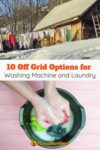
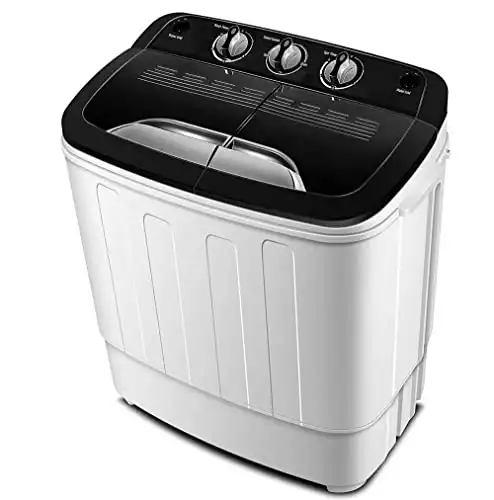
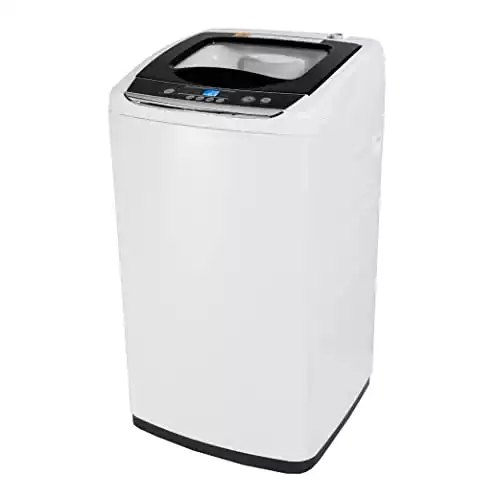
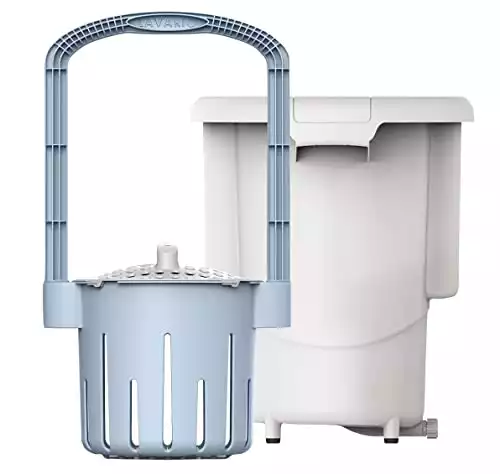
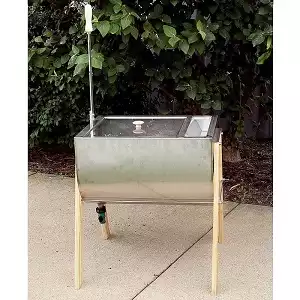
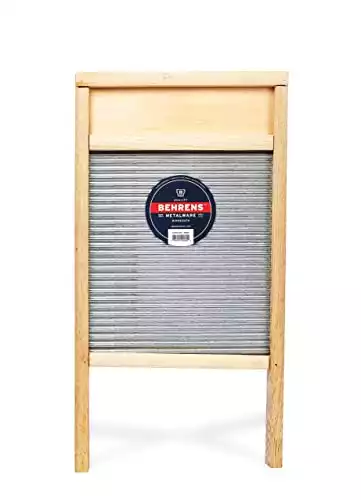
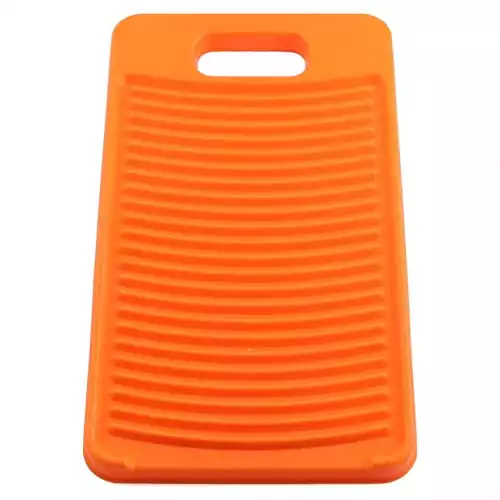
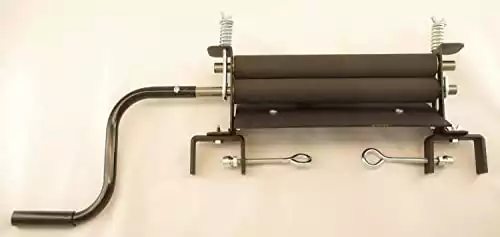


My water pipes busted when I was in Texas and my house is in Colorado and I came home I didn’t have water for our running water for three to almost 4 weeks. My neighbor would bring buckets of water over for me and for drinking I would go bye reversible water but I used the bucket situation to wash my clothes because I had electricity but I had no water to go in there and I found out how much my washing machine wastes water, it’s ridiculous.
I didn’t mind washing my clothes that way at all. I would heat water on the stove if I need it warm water to wash my clothes and take a shower. I would feel a five gallon bucket up I would take a large plastic drinking glass and go in the shower and take a shower that way.
Wow i just bought a twin tub one last night, then today i come across this article out of the blue!